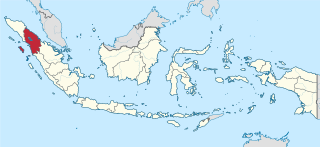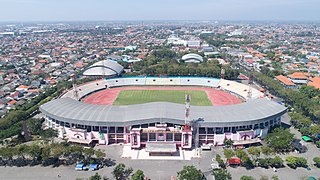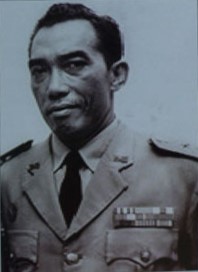
Siwaluh Jabu is a tribal house of the Karo people of Indonesia. [1] Siwaluh jabu also refers to Karo people in ancient times. [1]

Siwaluh Jabu is a tribal house of the Karo people of Indonesia. [1] Siwaluh jabu also refers to Karo people in ancient times. [1]

North Sumatra is a province of Indonesia located on the northern part of the island of Sumatra. Its capital and largest city is Medan. North Sumatra is Indonesia's fourth most populous province after West Java, East Java and Central Java, and also the most populous in the island of Sumatra. It covers an area of 72,981 km2. According to the 2020 census, the province's population in that year was 14,799,361. The mid-2021 official estimate is 14,936,148.

Batak is a collective term used to identify a number of closely related Austronesian ethnic groups predominantly found in North Sumatra, Indonesia, who speak Batak languages. The term is used to include the Karo, Pakpak, Simalungun, Toba, Angkola, and Mandailing which are related groups with distinct languages and traditional customs (adat).

Deli Serdang is a regency in the Indonesian province of North Sumatra. It surrounds the city of Medan, and also borders the city of Binjai, which is effectively a bedroom community for Medan. It occupies an area of 2,497.72 sq.km. The capital of the district is Lubuk Pakam, which is located approximately 30 km east of Medan. The national census of 2000 recorded 1,573,987 people, but by 2010 the regency's population increased by 13.76% to 1,790,431, and at the 2020 Census the total was 1,931,441. The official estimate as at mid 2021 was 1,941,374. Kualanamu International Airport is located in this regency.
Karo may refer to:

The Karo, or Karonese, are a people of the Tanah Karo and part one of Batak people sub-ethnic group from North Sumatera, Indonesia. The Karo lands consist of Karo Regency, plus neighboring areas in East Aceh Regency, Langkat Regency, Dairi Regency, Simalungun Regency and Deli Serdang Regency. In addition, the cities of Binjai and Medan, both bordered by Deli Serdang Regency, contain significant Karo populations, particularly in the Padang Bulan area of Medan. The town of Sibolangit, Deli Serdang Regency in the foothills on the road from Medan to Berastagi is also a significant Karo town.

The Batak languages are a subgroup of the Austronesian languages spoken by the Batak people in the Indonesian province of North Sumatra and surrounding areas.
Kiras Bangun, also known as Garamata is a national hero of Indonesia.

Karo, referred to in Indonesia as Bahasa Karo, is an Austronesian language that is spoken by the Karo people of Indonesia. It is used by around 600,000 people in North Sumatra. It is mainly spoken in Karo Regency, southern parts of Deli Serdang Regency and northern parts of Dairi Regency, North Sumatra, Indonesia. It was historically written using the Batak alphabet which is descended from the Brahmi script of ancient India by way of the Pallava and Old Kawi scripts, but nowadays only a tiny number of Karo can write or understand the script, and instead the Latin script is used.

The Gereja Batak Karo Protestan or Karo Batak Protestant Church is the largest church among the largely Christian Karo people of North Sumatra, Indonesia. It was established formally in 1941.
Pagit-pagit or terites is a food consumed by the Karo people of North Sumatra, Indonesia. The main ingredient is the partially digested grass from the rumen of a ruminant, typically a deer, goat, cow or water buffalo. It will be cooked with spices and either coconut milk, cempokak and tapioca leaves or with meat as a clear soup.

Batak architecture refers to the related architectural traditions and designs of the various Batak peoples of North Sumatra, Indonesia. There are six groups of Batak who speak separate but related languages: the Angkola, the Mandailing to the south, the Toba, to the north the Pakpak/Dairi, the Simalungun, and the Karo. While the groups are now Muslim or Christian, elements of the ancient Batak religion remain, particularly amongst the Karo.

Rumah adat are traditional houses built in any of the vernacular architecture styles of Indonesia, collectively belonging to the Austronesian architecture. The traditional houses and settlements of the several hundreds ethnic groups of Indonesia are extremely varied and all have their own specific history. It is the Indonesian variants of the whole Austronesian architecture found all over places where Austronesian people inhabited from the Pacific to Madagascar each having their own history, culture and style.

Batak cuisine is the cuisine and cooking traditions of Batak ethnic groups, predominantly found in Northern Sumatra region, Indonesia. Batak cuisine is part of Indonesian cuisine, and compared to other Sumatran cuisine traditions, it is more indigenously preserved. One characteristic of Batak cuisine is its preference to andaliman as the main spice. That is why andaliman in Indonesia sometimes dubbed as "Batak pepper".

Pemena is a tribal religion of Karo people of Indonesia. Pemena means the first or the beginning. Pemena is regarded as the first religion of Karo people. One of the doctrines of Pemena is the concept of Dibata.

The Aru was a major Sumatran kingdom from the 13th to the 16th century. It was located on the eastern coast of North Sumatra, Indonesia. In its heyday the kingdom was a formidable maritime power, and was able to control the northern part of the Malacca strait.

A jambur is a structure that is used as a multipurpose hall by the Karo people of North Sumatra, Indonesia. The traditional jambur is a large pavilion-like structure, raised above ground, wall-less, and placed under a large Karo traditional house roof style. Karo ritual ceremonies e.g. wedding feast, funeral, or general feasts are held within the jambur. Jambur can still be found in big cities of North Sumatra, e.g. Medan, Kabanjahe, Berastagi, as well as small villages in the Karo lands.

Geriten, or "head-house", is the skull-house of the Karo people of North Sumatra, Indonesia. It is a pavilion-like structure with a distinctively shaped roof that acted as an ossuary where skulls of chiefs and important individuals are preserved after their deaths.

Karo United Football Club is an Indonesian football club based in Kabanjahe, Karo Regency, North Sumatra. They currently compete at Liga 2. In the 2021–22 Liga 3, Karo United came out as champions after defeating Putra Delta Sidoarjo, this is their first title in the club's history.

The 2022 Liga 3 Final was the final that decided the winner of the 2021–22 Liga 3, the seventh season of third-tier competition in Indonesia organised by PSSI, and the fifth season since it was renamed from the Liga Nusantara to the Liga 3 between Karo United and Putra Delta Sidoarjo. It was played on 30 March 2022 at Gelora Delta Stadium, Sidoarjo.

Lieutenant General Djamin Ginting, was an Indonesian military officer and independence fighter from Tanah Karo. He was appointed a National Hero of Indonesia by President Joko Widodo on 7 November 2014.